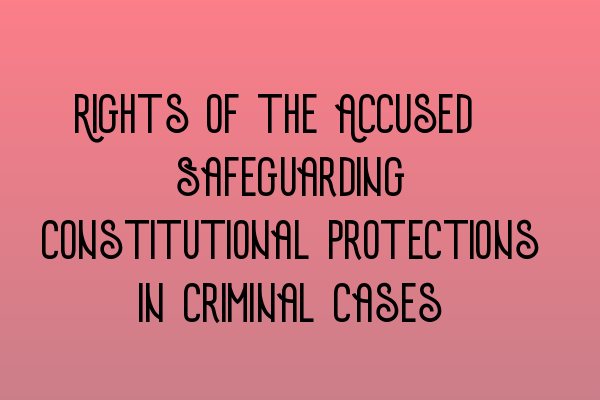Rights of the Accused: Safeguarding Constitutional Protections in Criminal Cases
In the criminal justice system, the rights of the accused play a crucial role in ensuring a fair and just process. These rights are not mere formalities but essential safeguards designed to protect individuals from potential abuses of power by the state. Understanding and upholding these constitutional protections is of paramount importance in criminal cases.
The Presumption of Innocence
One of the fundamental rights of the accused is the presumption of innocence. This principle holds that an individual is to be considered innocent until proven guilty beyond a reasonable doubt. It serves as the cornerstone of a fair trial and prevents the unjust conviction of innocent individuals. To learn more about this topic, consider reading our article on SQE 1 Practice Mocks FLK1 FLK2.
The Right to Legal Representation
Another vital right is the right to legal representation. Every accused person has the right to be represented by a lawyer who can provide them with competent advice and representation throughout the legal process. This ensures that the accused is able to effectively present their case and challenge the evidence against them. For more information on the role of legal representation, you may find our article on SQE 1 Practice Exam Questions useful.
The Right to a Speedy and Public Trial
The right to a speedy and public trial is another crucial safeguard in criminal cases. This right ensures that accused individuals are not subjected to unnecessary delays in the judicial process, allowing them to resolve their cases promptly. Additionally, the right to a public trial helps to maintain transparency and accountability in the criminal justice system. To discover more about the importance of this right, we recommend reading our article on SQE 2 Preparation Courses.
The Right to Confront Witnesses
Accused individuals have the right to confront and cross-examine witnesses against them. This right is crucial for testing the credibility and reliability of the prosecution’s case. It ensures that the accused has the opportunity to challenge the evidence presented and present a robust defense. If you want to learn more about this right, you can refer to our article on SQE 1 Preparation Courses.
The Protection against Self-Incrimination
The protection against self-incrimination is a fundamental right guaranteed to the accused. This right allows individuals to remain silent and avoid providing evidence against themselves. It prevents the state from coercing confessions or using statements made under duress as evidence. For a more detailed understanding of this protection, you can explore our article on SRA SQE Exam Dates.
Conclusion
Protecting the rights of the accused is essential to maintain a fair and reliable criminal justice system. These constitutional protections ensure that individuals are not subjected to arbitrary or unjust treatment by the state. Understanding and upholding the rights of the accused is not only a legal and ethical imperative but also crucial for ensuring a just outcome in criminal cases.
